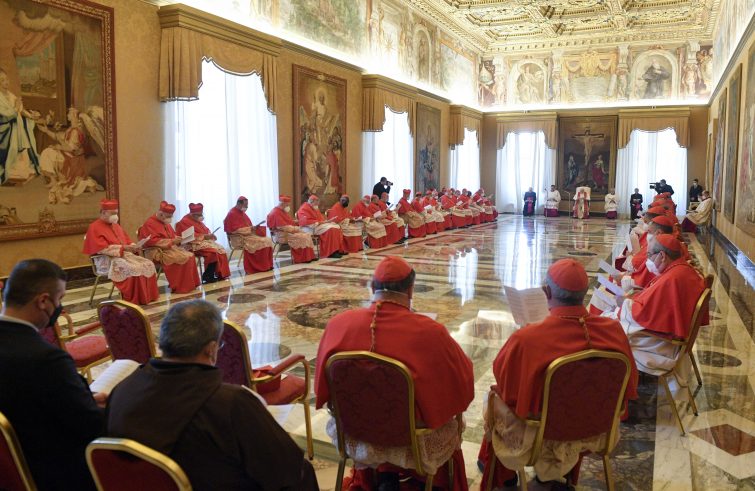
An increasingly missionary Roman Curia, at the service of the local Churches in a spirit of synodality and “sound decentralisation.” These are the distinctive features of the Apostolic Constitution ‘Praedicate Evangelium’ on Roman Curia and its service to the Church in the world, promulgated by the Pope on March 19, the Solemnity of St Joseph, effective as of June 5, the Solemnity of Pentecost. The new Apostolic Constitution replaces the Apostolic Constitution ‘Pastor Bonus’ promulgated by John Paul II in 1988. It brings to completion the reform of the Roman Curia initiated by Francis at the outset of his pontificate – following a request by the cardinals during pre-conclave meetings – pursued in a spirit of collegiality and synodality with the contribution of the Council of Cardinals, with meetings from October 2013 to last February.
The reform is not an end in itself. “The reform of the Roman Curia will be effective and attainable if it stems from an inner reform, whereby we embrace the paradigm of spirituality of the Council, exemplified in the ancient story of the Good Samaritan, the man who stops on his way to help an injured man who is not one of his people and whom he doesn’t know.” That is the underlying theme of the new Constitution, consisting of 250 articles. The inspiring principle is “a spirituality having its fountainhead in the love of God who loved us first, while we were yet unworthy sinners, reminding us that it is our duty to serve our brothers and sisters as Christ did, especially those most in need, and that in every human face, especially the face of the suffering men and women, we see the face of Christ.”
Hence, in the Pope’s vision, the reform “is not an end in itself,
but a means for bearing powerful Christian witness; to foster more effective evangelism; to promote a more fruitful ecumenical spirit; to encourage a more constructive dialogue with all.”
Fewer dicasteries, openness to the laity. “It became necessary to reduce the number of Dicasteries, merging together those with similar or complementary purposes, and rationalising their functions with the aim of avoiding overlapping competences and improving efficiency”, is the “rationale” of the reform, which opens up to the laity.
“Any member of the faithful” can head one of newly constituted Vatican dicasteries or other bodies, “on account of their specific competence, power of governance and function”,
reads the text, which also mentions the need for “sound decentralisation” in the relationship between the Curia and the particular Churches.
Evangelisation first. The creation of a Dicastery for Evangelisation presided over directly by the Pope – the first in the list of Dicasteries, which merges the Pontifical Council for Promoting the New Evangelization and the Congregation for the Evangelization of Peoples – and of a new Dicastery for the Service of Charity, are the most relevant developments enshrined in the new Constitution, along with a new disciplinary section within the Dicastery for the Doctrine of the Faith and the creation of the Dicastery for Culture and Education. The Roman Curia will thus be composed of sixteen Dicasteries plus judicial bodies, financial bodies, three Offices (Prefecture of the Papal Household, Office for the Liturgical Celebrations of the Supreme Pontiff, Camerlengo of the Holy Roman Church), Legal Officers and institutions connected with the Holy See. Besides the Section for General Affairs and the Section for Relations with States and International Organisations, the Secretariat of State – now renamed “Papal Secretariat” – includes a Section for the Diplomatic Staff of the Holy See. The Dicastery for Evangelisation has a very specific structure, presided over “directly by the Roman Pontiff” and governed by two pro-prefects, one for each section of the Dicastery: the first “for the fundamental questions of evangelisation in the world”, with responsibilities also for catechesis; the second “for first evangelisation and the new particular Churches”, to which the Pontifical missionary works are entrusted. Through the Disciplinary Office, the Disciplinary Section of the Dicastery for the Doctrine of the Faith “deals with offences reserved to the Dicastery”, with corresponding sanctions, and it incorporates the Commission for the Protection of Minors.
The Service of Charity. The Dicastery for the Service of Charity – or Office of Papal Charities – is under the direction of the Almoner of His Holiness. It “offers charitable assistance to the poor throughout the world” in the name of the Holy Father, who “in cases of special need or other necessity, personally sets out the aids to be given.” The task of the Dicastery is also “to receive, seek and request free donations for the works of charity offered by the Roman Pontiff to those most in need.” The Dicastery for Culture and Education – resulting from the merging of the Pontifical Council for Culture and the Congregation for Catholic Education – has two respective sections: the Section for Culture, which “promotes and encourages dialogue amongst the manifold cultures that exist in the Church”, and the Section for Education, which is in charge – among other things – of Catholic schools at all levels of education and promotes the teaching of the Catholic religion in schools.











